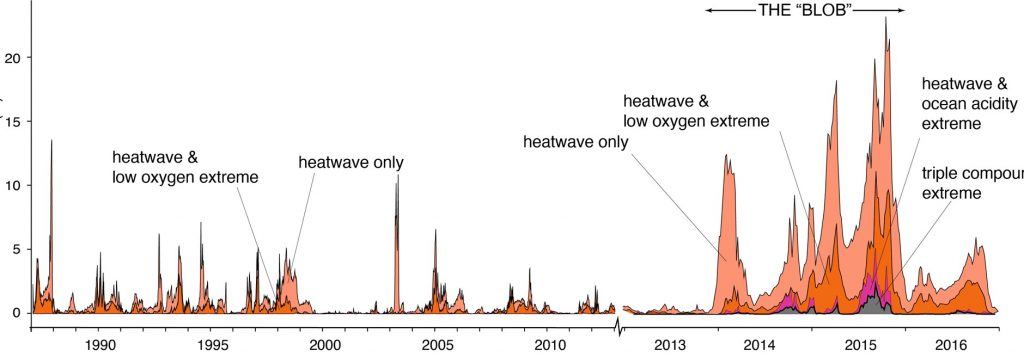Figure above: The temporal evolution of extreme events in the Northeast Pacific. Shown is a time series of the fractional area (20° N–60° N, 115° W–155° W) that is subject to a marine heatwave (light orange), a dual compound event (dark orange or purple) or triple compound event (grey). An event contributes to this metric when at least 25% of the top 100 m of the water column is be extreme for the considered properties. The figure is based on a hindcast simulation using a regional ocean biogeochemical model.
Authors: Nicolas Gruber (ETH Zürich, Switzerland), Meike Vogt (ETH Zürich, Switzerland), Thomas L. Frölicher (University of Bern, Switzerland), Philip W. Boyd (University of Tasmania, Australia)
While much is known about extreme weather events on land, there has been little research into those that occur in the ocean. Using models, we show for the first time that marine heatwaves, and extremes with high acidity or low oxygen can also occur conjointly – with difficult to foresee consequences for marine life.
In 2015, a massive marine heatwave occurring off the coasts of North America caught the headlines. This event, which became known as the “Blob” had huge effects on marine ecosystems, causing, among others, a loss of primary production, large range shifts of many fish, extended blooms of harmful algae with devastating effects on the mussel and crab fisheries, and massive die-offs of seabirds, seals and sea lions.
In their recent article, the authors use model simulations to argue, among others, that during the “Blob” event the upper water column in the Northeast Pacific was not only unusually hot, but also characterized by extreme conditions with respect to ocean acidity (extremely low pH or high [H+]) and oxygen (extremely low oxygen) (Figure). This means that the Blob might have been a triple compound extreme event, i.e., an event when three biologically relevant parameters became extreme at the same time. It is thus not unreasonable to expect that some of the ecosystem consequences of the Blob could be the result of the ocean acidity and low oxygen extremes having aggravated the effects of the hot temperatures.
In their Perspectives article, the authors use this potential triple compound event as a smoking gun to advance our view that we vastly need to ramp up our attention to (i) ocean extremes and (ii) compound events as they could become harmful to marine organisms and ecosystems way before the effects of the more slowly evolving
Read more here
